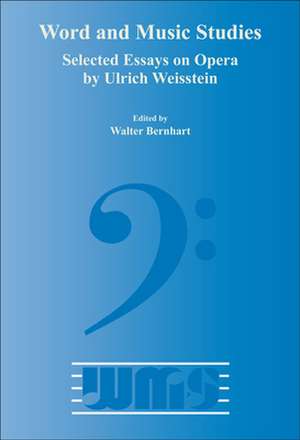Selected Essays on Opera by Ulrich Weisstein: Word and Music Studies, cartea 8
Walter Bernharten Limba Engleză Paperback – 31 dec 2005
The necessarily stringent selection of essays from Professor Weisstein’s large output on opera, reflecting fifty years of involvement with the genre, is primarily governed by the wish to present texts that are representative of their author’s work and, at the same time, are unlikely to be readily available through other channels. The fourteen essays collected are arranged in chronological order, some of them showing Ulrich Weisstein as an initiator of librettology, others tracing adaptive processes extending from textual sources to final operas, or investigating writer/composer collaborations. Further topics are satirical reflections on operatic activities in early-eighteenth-century Italy and practices of opera censorship, artist operas or definitions of romantic and epic opera. The essays are written in an accessible, essentially non-technical language and are expected to make both a profitable and a pleasurable reading for literary scholars as well as musicologists and general art lovers.
Preț: 564.65 lei
Preț vechi: 688.60 lei
-18% Nou
Puncte Express: 847
Preț estimativ în valută:
108.04€ • 113.11$ • 89.40£
108.04€ • 113.11$ • 89.40£
Carte indisponibilă temporar
Doresc să fiu notificat când acest titlu va fi disponibil:
Se trimite...
Preluare comenzi: 021 569.72.76
Specificații
ISBN-13: 9789042021112
ISBN-10: 904202111X
Dimensiuni: 150 x 220 mm
Greutate: 0.68 kg
Editura: Brill
Colecția Brill
Seria Word and Music Studies
ISBN-10: 904202111X
Dimensiuni: 150 x 220 mm
Greutate: 0.68 kg
Editura: Brill
Colecția Brill
Seria Word and Music Studies
Cuprins
Preface
Selected Essays on Opera by Ulrich Weisstein
The Libretto as Literature (1961)
Cocteau, Stravinsky, Brecht, and the Birth of Epic Opera (1962)
Introduction to The Essence of Opera (1964)
Reflections on a Golden Style: W.H. Auden’s Theory of Opera (1970)
“Per porle in lista”: Da Ponte/Leporello’s Amorous Inventory and its Literary and Operatic Antecedents from Tirso de Molina to Giovanni Bertati (1981)
Educating Siegfried (1984)
(Pariser) Farce oder wienerische Maskerade? Die französischen Quellen des Rosenkavalier (1987)
The Little Word und: Tristan und Isolde as Verbal Construct (1987)
Benedetto Marcellos Il Teatro alla moda: Scherz, Satire, Parodie oder tiefere Bedeutung? (1989)
Von Ballhorn ins Bockshorn gejagt: Unwillkürliche Parodie und unfreiwillige Komik im Ambroise Thomas’ Mignon (1989)
“Die letzte Häutung”. Two German Künstleropern of the Twentieth Century: Hans Pfitzner’s Palestrina and Paul Hindemith’s Mathis der Maler (1992)
Between Progress and Regression: The Text of Stravinsky’s Opera The Rake’s Progress in the Light of its Evolution (1992)
What is Romantic Opera? Toward a Musico-Literary Definition (1994)
Böse Menschen singen keine Arien: Prolegomena zu einer ungeschriebenen Geschichte der Opernzensur (1996)
Sources
Acknowledgments
Index of Persons and Operas Mentioned in the Text
Selected Essays on Opera by Ulrich Weisstein
The Libretto as Literature (1961)
Cocteau, Stravinsky, Brecht, and the Birth of Epic Opera (1962)
Introduction to The Essence of Opera (1964)
Reflections on a Golden Style: W.H. Auden’s Theory of Opera (1970)
“Per porle in lista”: Da Ponte/Leporello’s Amorous Inventory and its Literary and Operatic Antecedents from Tirso de Molina to Giovanni Bertati (1981)
Educating Siegfried (1984)
(Pariser) Farce oder wienerische Maskerade? Die französischen Quellen des Rosenkavalier (1987)
The Little Word und: Tristan und Isolde as Verbal Construct (1987)
Benedetto Marcellos Il Teatro alla moda: Scherz, Satire, Parodie oder tiefere Bedeutung? (1989)
Von Ballhorn ins Bockshorn gejagt: Unwillkürliche Parodie und unfreiwillige Komik im Ambroise Thomas’ Mignon (1989)
“Die letzte Häutung”. Two German Künstleropern of the Twentieth Century: Hans Pfitzner’s Palestrina and Paul Hindemith’s Mathis der Maler (1992)
Between Progress and Regression: The Text of Stravinsky’s Opera The Rake’s Progress in the Light of its Evolution (1992)
What is Romantic Opera? Toward a Musico-Literary Definition (1994)
Böse Menschen singen keine Arien: Prolegomena zu einer ungeschriebenen Geschichte der Opernzensur (1996)
Sources
Acknowledgments
Index of Persons and Operas Mentioned in the Text
Notă biografică
Ulrich Weisstein is Professor Emeritus of Indiana University, USA, where he taught German, English and Comparative Literature. His list of publications has nearly reached 400 entries, including fourteen book publications, among them his seminal Einführung in die vergleichende Literaturwissenschaft (1968), which was translated into English, Spanish, Japanese, Korean, Chinese, and Arabic.
Walter Bernhart is Professor of English Literature at the University of Graz. His numerous publications include ‘True Versifying’: Studien zur elisabethanischen Verspraxis und Kunstideologie (1993); “Überlegungen zur Lyriktheorie aus erzähltheoretischer Sicht” (1993); “Iconicity and Beyond in ‘Lullaby for Jumbo’: Semiotic Functions of Poetic Rhythm” (1999); “Lied som intermedial konstform” (2002); “The ‘Destructiveness of Music’: Functional Intermedia Disharmony in Popular Songs” (2002); “Narrative Framing in Schumann’s Piano Pieces” (2005). He is executive editor of two book series, Word and Music Studies (WMS) and Studies in Intermediality (SIM), both published by Rodopi, Amsterdam/New York.
Walter Bernhart is Professor of English Literature at the University of Graz. His numerous publications include ‘True Versifying’: Studien zur elisabethanischen Verspraxis und Kunstideologie (1993); “Überlegungen zur Lyriktheorie aus erzähltheoretischer Sicht” (1993); “Iconicity and Beyond in ‘Lullaby for Jumbo’: Semiotic Functions of Poetic Rhythm” (1999); “Lied som intermedial konstform” (2002); “The ‘Destructiveness of Music’: Functional Intermedia Disharmony in Popular Songs” (2002); “Narrative Framing in Schumann’s Piano Pieces” (2005). He is executive editor of two book series, Word and Music Studies (WMS) and Studies in Intermediality (SIM), both published by Rodopi, Amsterdam/New York.












